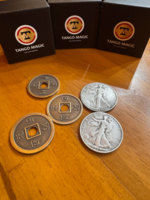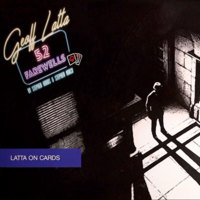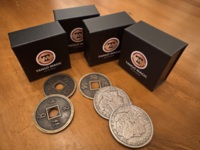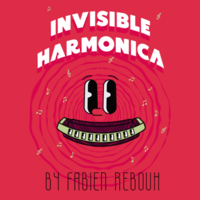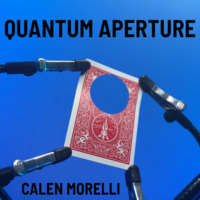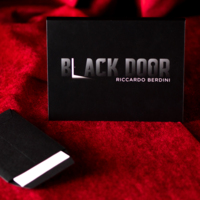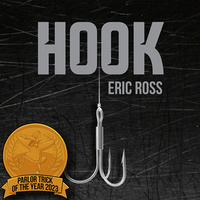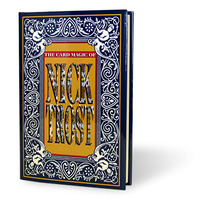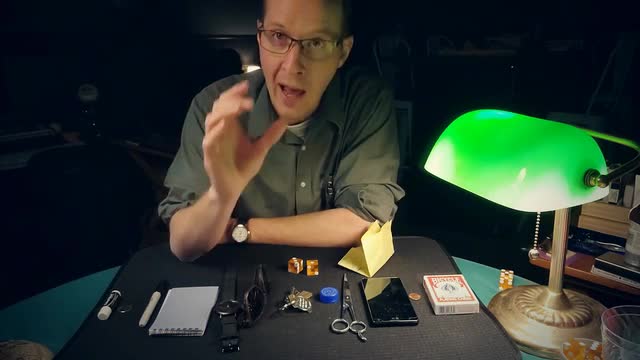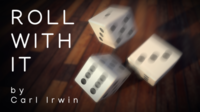Roll With It by Carl Irwin (Instant Download)
A powerful method... in all probability!
| Price: | $10.00 |
"Roll With It" is an examination of outcomes with a roll of normal dice or randomly displayed fingers on hands. Carl takes you through presentations with a single die and two dice where spectators roll to identify a random object among many. Their selection is found to match the performer's prediction. Carl explains probability and perception as a means to control and force random outcomes. Additionally, methods are taught for PIN number, receipt sum, raffle and lottery ticket predictions. Roll With It includes a .pdf with reference tables for each principle discussed in the video. Additionally, this download includes a BONUS video for "Loose Change", an accessible coin index concept that only uses coins.
Topics Discussed:
- Sixth Sense (prediction with 6 objects)
- Roll With It (prediction with 12 objects)
- Saturation Principle for "multiple outs"
2-4 Dice Rolls
Fingers On 2-3 Hands
PIN code predictions
Lottery Ticket predictions
Card at Number forces
"Roll With It" avoids using math at the moment of presentation. Spectators are not asked to add or subtract numbers to get a result. The goal of "Roll With It" is to have spectators make direct choices and then have those choices applied in the presentation.
ASK HERE
Featured Magic Tricks
4 star 50%
3 star 50%
2 star 0%
1 star 0%

 Magic with numbers but without math
Report this review
Magic with numbers but without math
Report this review
It’s 70 minutes of affable explanation in his trademark style of speaking to the camera as if you were across the table. I found it slow to really get started, but there is substance and value as it proceeds. There is a bonus video and a pdf that explains the significance the combinations that dice generate.
Carl is keen to avoid the magician or audience members doing addition or other basic arithmetic operations. It’s about tilting the odds, not doing the sums.
What is it about?
One theme is how to roll two dice apparently to freely choose an item in an array of 12 items.
The goal is to force one item, but without obtrusive restrictions or artificiality in the process.
The aim is to maximise the likelihood of plausibly arriving at the force. The suggested scripting overall does this intelligently, but there’s something I’d improve in the case where the number rolled is one short of the location of the force. Scripting elegantly deflects unfavourable rolls.
Another theme is how to use dice rolls to constrain the choice of two- or three-digit numbers to perform lottery, an ACAAN, and presumably book (or word) tests. (Check out Irwin’s Pick Six, https://www.penguinmagic.com/p/16976)
We could work much of this out ourselves, but Carl guides us through, and offers good scripting tips designed to restrict options while seeming to widen them.
Use and versatility
Potential advantages of such routines:
--familiar and genuinely innocent props
--built-in audience participation in freely choosing numbers, and
--there’s natural scope for banter.
Compared to what?
Most would be familiar with rather lame effects where a row of 6 options is presented and the participant invited to think of a number from 1 to 6. “Five? F-I-V-E”, and indicating the fourth item, after counting from the right or left of the series as required.
Carl Irwin’s thinking is vastly superior, if this is the main point of comparison. Carl does not refer to anybody else’s comparable work on making selections using dice, precedents that may or may not exist. However, dice certainly do things other methods can’t.
The Common Magician tends strongly to free us from our dependence on buying props and gimmicks.
It’s only $10, so if there’s even one idea that solves a problem you have with an otherwise appealing routine in this broad genre, it’d be worth it.

 Still to obvious
Report this review
Still to obvious
Report this review
I think it is an excellent attempt to do something in a new way. however, I don't think the method is better hidden than the already existing ones, which are argued for in the video. this seems to me as a "kill you darling” project

Act Builder beta









